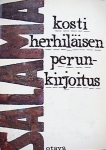apartments in Korea, once again
 Valerie Gelezeau's study on the Korean concept of "apartment" (house) has been available in Korean for a year now, but I needed to take a look at a column (or perhaps essay) by Kang Joon-man (Mystery of the Apartment Republic, Hankyoreh21) to learn about it. (My note from March 2004 on Gelezeaus's original work in French.) Valerie Gelezeau's study on the Korean concept of "apartment" (house) has been available in Korean for a year now, but I needed to take a look at a column (or perhaps essay) by Kang Joon-man (Mystery of the Apartment Republic, Hankyoreh21) to learn about it. (My note from March 2004 on Gelezeaus's original work in French.)Kang's essay first quotes some foreigners to emphasize how special the social position of apartment housing in South Korea is. He writes as if Gelezeau had experienced several "shocks" (ch'ungkyôk) because of Koreans' responses to her research on apartments and living in them, but I'll attribute that to Kang's interpretation of Geleuze's experiences - or to translator's choice of words. I just don't expect researchers to feel ch'ungkyôks when the object of study expresses doubts of the relevance of the topic... Kang credits a lot of the current social stratification ("distinction") or social segregationing to the central position of apartment life in the mental landscape of Koreans. I don't intend to deny that, but to attribute it to apartments itself rather than to the position of housing as an important social signifier makes good-sounding social and cultural criticism but gives more credence to concretes structures than people attaching significance to those structures. The most desired form of housing doesn't need to be a high-rise apartment for housing to be significant in producing social stratification. (Now this sounds like a truism, doesn't it.) Categories at del.icio.us/hunjang: books ∙ academic ∙ housing ∙ urbanspace ∙ stratification |


Comments to note "apartments in Korea, once again" (Comments to posts older than 14 days are moderated)
Write a Comment